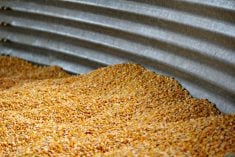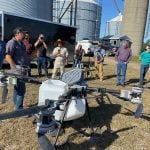A U.S. district court has tossed out a proposed suit by a clutch of U.S. and Canadian organic farmers and ag groups against Monsanto, blasting the suit’s claimed fears of patent-infringement actions as a bid to "create a controversy where none exists."
Judge Naomi Buchwald of the U.S. District Court (Southern District of New York) on Friday granted Monsanto’s motion to dismiss the suit, which had been spearheaded for the plaintiffs by the New York City-based Public Patent Foundation (PUBPAT).
Read Also

Alberta Crop Report: Harvest reaches completion
Alberta’s harvest is virtually complete at 99.4 per cent finished, ahead of the five-year and 10-year averages at this time of the season.
The 83 plaintiffs, including Ottawa-based Canadian Organic Growers (COG) and Quebec’s Union Paysanne among others, billed their suit as a pre-emptive strike against any chance that the seed and ag chem firm — developer of the patented Roundup Ready genetics for herbicide-tolerant crops — could sue them for patent infringement.
PUBPAT filed its suit in March last year, claiming the foundation’s clients fear transgenic seed contamination in their crops and do not "intend to possess, use or sell any transgenic seed, including any transgenic seed potentially covered by Monsanto’s patents."
"When Monsanto actively reserves the right to sue organic and non-GMO farmers, it’s critical to stand up to these bullying tactics," COG board member Arnold Taylor said in a release when the case went to oral arguments before Buchwald last month. "Hundreds of farmers have already been sued by Monsanto, including many in Canada."
To alleviate the clients’ fears of crop contamination, PUBPAT wanted Monsanto to "expressly waive any claim for patent infringement it may ever have against our clients and memorialize that waiver by providing a written covenant not to sue."
Monsanto, while not promising a blanket waiver, replied that its company policy "has never been, nor will be, to exercise its patent rights where trace amounts of its patented seed or traits are present in a farmer’s fields as a result of inadvertent means."
PUBPAT’s suit listed a number of farmers who, the plaintiffs claimed, "did not want to be contaminated by transgenic seed" but had been sued by Monsanto.
The only Canadian farmer PUBPAT’s claim mentioned by name is Percy Schmeiser. Monsanto had successfully sued the Bruno, Sask. farmer for patent violation over Roundup Ready canola in 2001, a decision upheld at the Supreme Court of Canada in 2004.
"Equally lame"
Buchwald, in her ruling, rejected PUBPAT’s claim that Monsanto had sued farmers who didn’t want to have the company’s genetics in their crops, writing "that claim is belied by the decisions in the suits against the referenced individuals."
To that end she referenced four cases, including Schmeiser’s, noting the Canadian court ruling that Schmeiser "knew or ought to have known" he was seeding Roundup-tolerant crops.
"The suits against dissimilar defendants… at best, are only minimal evidence of any objective threat of injury to plaintiffs," Buchwald wrote. The plaintiffs’ "alternative allegations" that Monsanto had threatened but not sued "inadvertent users" of its genetics were "equally lame," she added.
Rather, she noted, not one of the plaintiffs had claimed to be so threatened "and they have in fact professed a desire to specifically avoid any such use" of Monsanto’s genetics.
Buchwald also rejected the plaintiffs’ claim that Monsanto’s statement of its company policy — offered in response to a written request from PUBPAT for a blanket waiver, after the suit was filed — was somehow meant to "implicitly threaten" farmers and seed growers who weren’t the company’s customers.
If she were to accept the plaintiffs’ bid and make Monsanto’s statement into grounds for maintaining their case, Buchwald wrote, such a ruling would send a chill through any patent holder who wants to comfort anyone he or she doesn’t plan to sue.
The plaintiffs’ argument to the contrary "is baseless and their tactics not to be tolerated," the judge wrote. The fact that Monsanto did not want to sign a covenant not to sue, she added, was not surprising and "borders on the wholly irrelevant."
Monsanto’s statement of its company policy, Buchwald wrote, was "simply the product of a transparent effort to create a controversy where none exists."
"While I have great respect for Judge Buchwald, her decision to deny farmers the right to seek legal protection from one of the world’s foremost patent bullies is gravely disappointing,” PUBPAT lead attorney Daniel Ravicher said in a release Monday.
The plaintiffs, he said, have the right to take the case to the U.S. Court of Appeals, which would review the case “without deference to (Buchwald’s) findings."
David Snively, general counsel for St. Louis, Mo.-based Monsanto, said Monday that Buchwald’s decision "underscores that agricultural practices such as ag biotechnology, organic and conventional systems do and will continue to effectively coexist in the agricultural marketplace.”
Buchwald’s ruling, he said, “tore down a historic myth which is commonly perpetuated against our business by these plaintiffs and other parties through the internet."
Apart from COG and Union Paysanne, other Canadian plaintiffs in the suit included:
- the Manitoba Organic Alliance, at Plumas, Man.;
- the Peace River Organic Producers Association, at Silver Valley, Alta.;
- Murray Bast, at Wellesley, Ont.;
- Mumm’s Sprouting Seeds, at Parkside, Sask.;
- Interlake Forage Seeds of Fisher Branch, Man.;
- Quinella Ranch, near Regina;
- Nature’s Way Farm at Grimshaw, Alta.; and
- Levke and Peter Eggers Farm at La Glace, Alta.
Related stories:
Organic players join "pre-emptive" U.S. suit against Monsanto, April 5, 2011
More Canadians hop onto Monsanto GMO suit, June 1, 2011
Organic farmers’ suit against Monsanto goes to hearing, Jan. 5, 2012
















